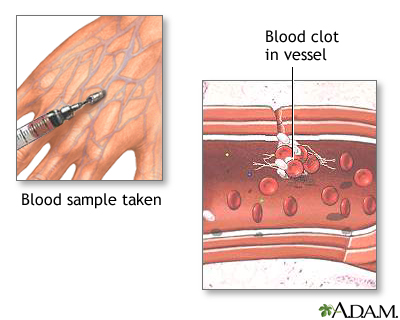Health Library
Disseminated intravascular coagulation (DIC)
Consumption coagulopathy; DIC
Disseminated intravascular coagulation (DIC) is a serious disorder in which the proteins that control blood clotting become overactive.
Images



I Would Like to Learn About:
Causes
When you are injured, proteins in the blood that form blood clots travel to the injury site to help stop bleeding. If these proteins become abnormally active throughout the body, you could develop DIC. The underlying cause is usually due to inflammation, infection, or cancer.
In some cases of DIC, small blood clots form in the blood vessels. Some of these clots can clog the vessels and cut off the normal blood supply to organs such as the liver, brain, or kidneys. Lack of blood flow can damage and cause major injury to the organs.
In other cases of DIC, the clotting proteins in your blood are consumed. When this happens, you may have a high risk of serious bleeding, even from a minor injury or without injury. You may also have bleeding that starts spontaneously (on its own). The disease can also cause your healthy red blood cells to fragment and break up when they travel through the small vessels that are filled with clots.
Risk factors for DIC include:
- Blood transfusion reaction
- Cancer, especially certain types of leukemia
- Inflammation of the pancreas (pancreatitis)
- Infection in the blood, especially by bacteria or fungus
- Liver disease
- Pregnancy complications (such as placenta that is left behind after delivery)
- Recent surgery or anesthesia
- Severe tissue injury (as in burns and head injury)
- Large hemangioma (a blood vessel that is not formed properly)
Symptoms
Symptoms of DIC may include any of the following:
- Bleeding, from many sites in the body
- Blood clots
- Bruising
- Drop in blood pressure
- Shortness of breath
- Confusion, memory loss or change of behavior
- Fever
Exams and Tests
You may have any of the following tests:
- Complete blood count with blood smear exam
- Partial thromboplastin time (PTT)
- Prothrombin time (PT)
- Fibrinogen blood test
- D-dimer
Treatment
There is no specific treatment for DIC. The goal is to determine and treat the underlying cause of DIC.
Supportive treatments may include:
- Plasma transfusions to replace blood clotting factors if a large amount of bleeding is occurring.
- Blood thinner medicine (heparin) to prevent blood clotting if a large amount of clotting is occurring.
Outlook (Prognosis)
Outcome depends on what is causing the disorder. DIC can be life threatening.
Possible Complications
Complications from DIC may include:
- Bleeding
- Lack of blood flow to the arms, legs, or vital organs
- Stroke
When to Contact a Medical Professional
Go to the emergency room or call 911 or the local emergency number if you have bleeding that does not stop.
Prevention
Get prompt treatment for conditions known to bring on this disorder.
Related Information
Blood clotsSepsis
Hemolytic transfusion reaction
Liver disease
Mesenteric venous thrombosis
References
Levi M. Disseminated intravascular coagulation. In: Hoffman R, Benz EJ, Silberstein LE, et al, eds. Hematology: Basic Principles and Practice. 7th ed. Philadelphia, PA: Elsevier; 2018:chap 139.
Sarode R, Kessler CM. Coagulation and fibrinolysis. In: McPherson RA, Pincus MR, eds. Henry's Clinical Diagnosis and Management by Laboratory Methods. 24th ed. Philadelphia, PA: Elsevier; 2022:chap 40.
BACK TO TOPReview Date: 10/28/2021
Reviewed By: Todd Gersten, MD, Hematology/Oncology, Florida Cancer Specialists & Research Institute, Wellington, FL. Review provided by VeriMed Healthcare Network. Also reviewed by David Zieve, MD, MHA, Medical Director, Brenda Conaway, Editorial Director, and the A.D.A.M. Editorial team.
 | A.D.A.M., Inc. is accredited by URAC, for Health Content Provider (www.urac.org). URAC's accreditation program is an independent audit to verify that A.D.A.M. follows rigorous standards of quality and accountability. A.D.A.M. is among the first to achieve this important distinction for online health information and services. Learn more about A.D.A.M.'s editorial policy, editorial process and privacy policy. A.D.A.M. is also a founding member of Hi-Ethics. This site complies with the HONcode standard for trustworthy health information: verify here. |
The information provided herein should not be used during any medical emergency or for the diagnosis or treatment of any medical condition. A licensed medical professional should be consulted for diagnosis and treatment of any and all medical conditions. Links to other sites are provided for information only -- they do not constitute endorsements of those other sites. © 1997- 2022 A.D.A.M., a business unit of Ebix, Inc. Any duplication or distribution of the information contained herein is strictly prohibited.
